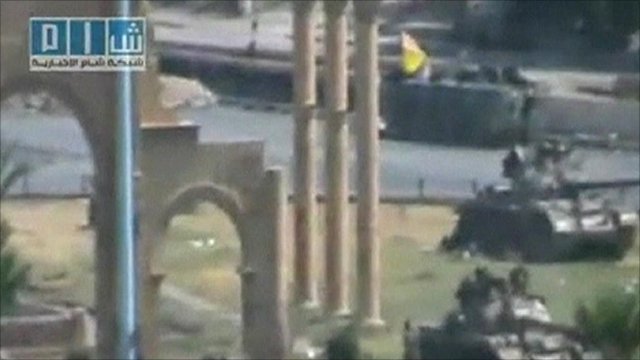 There have been fresh outbreaks of violence in Syria as army forces moved against anti-government protesters.
There have been fresh outbreaks of violence in Syria as army forces moved against anti-government protesters.
Overnight, six people were killed in the Erbin district of the capital Damascus as they staged protests after prayers on the first day of the Muslim holy month of Ramadan.
Earlier, four were killed in Hama, where scores died on Sunday, one of the bloodiest days of the uprising so far.
The UN Security Council is set to resume discussions on the crisis.
Russia has until now resisted agreeing to a resolution condemning the violence, but has indicated that it would back a lesser statement.
Rights groups say around 140 people have been killed by the authorities since Sunday, most of them in Hama.
The Syrian government has promised reforms but says citizens and its troops are being attacked by "armed gangs" backed by unspecified foreign powers.
International journalists have been denied access to Syria and it is not possible to verify accounts by witnesses and activists.
Machine guns
In all, 24 people were killed across Syria on Monday, Syrian Observatory for Human Rights chief Rami Abdel Rahman said, according to AFP news agency, though he did not give details of each case.
Six people were killed in the Erbin district of the capital Damascus early on Tuesday, residents and rights groups said.
"Security cars and pick-up trucks with machine guns mounted on their beds entered Erbin around midnight and assembled at the main roundabout before branching out in the streets and firing at neighbourhoods," one resident told Reuters news agency.
Another activist said tens of people had been wounded.
Earlier tanks and troops returned to the streets of Hama on Monday, after pulling out following Sunday's violence, said the BBC's Jim Muir in neighbouring Lebanon.
At least four people were killed on Monday, witnesses and rights groups said.
Residents said a hospital was among the buildings coming under attack.
There are reports that some families in the city have buried their dead in parks or in the gardens of their own homes because they are afraid to go out.
Another activist in the city told AFP news agency that 10 tanks were "indiscriminately" shelling the suburb of Dawar Bilal.
In other developments:
Two people, one a 13-year-old boy, were shot dead by security forces in the eastern town of Albu Kamal, Mr Rahman told AFP. The deaths came as tanks were said to have stormed the town following a two-week siege.
Government forces also moved in on Zabadani, near the border with Lebanon, with one report suggesting barricades had been erected to seal the town off
Reinforcements were also dispatched to Deir al-Zor, another rallying point for protesters. Residents reportedly said 29 people had been killed in a weekend assault on the town.
Government attempts to crush continuing protests across Syria have brought strong international condemnation and the UN Security Council is set to meet again on Tuesday to continue discussions on its response to the crisis.
UN response
At a closed-door meeting of the council on Monday, a top UN official told delegates that on top of those killed on Sunday, 3,000 people had gone missing and 12,000 been taken prisoner since the anti-regime protests erupted in mid-March, diplomats said.
Some council members including Russia have so far opposed a draft resolution condemning Damascus, proposing instead a less binding statement.
On Monday Russia's UN envoy Vitaly Churkin explained that stance, reportedly saying: "We are still under the shadow of events in Libya where we found a resolution adopted by the Security Council dealt with very frivolously, and we cannot but keep that in mind as we contemplate what the Security Council can and cannot do on Syria."
Mr Churkin said he would favour a statement, "which would be seen as a strong signal to end violence but also to come to terms politically and to move things forward peacefully in Syria."
But US Ambassador Susan Rice told reporters that citing the Libyan situation was "an excuse by those who don't want to confront what's happening in Syria".
Despite the differences, India's UN Ambassador Hardeep Singh Puri said he detected "a certain convergence of thinking... about the escalating violence".
On Monday, the European Union expanded sanctions against Syria, imposing asset freezes and travel bans against five more military and government officials, bringing the total number of individuals targeted to 35, including Syrian President Bashar al-Assad.



